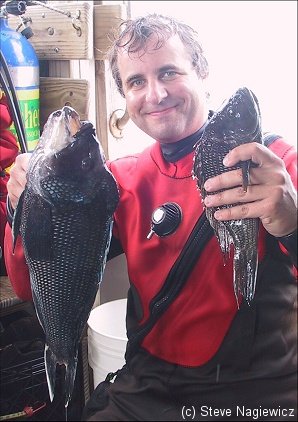Spearfishing Safety

on the right, and an enormous
18", 4-pound "Super-Male" on
the left. State record is 8 lbs 2 oz.
Spearfishing is really a solo activity. The presence of other divers in the water certainly does not preclude spearfishing, but the last thing you need is a buddy following you around in close proximity while you hunt, especially if he is spearfishing as well. This is in direct opposition to the conventionally accepted "buddy system" of diving and therefore makes spearfishing an activity only for more experienced divers who are capable of self-sufficiency in the water.
For every shot, assume you are going to miss. The resulting overshoot must never be a danger to other divers. This means either having visibility well in excess of the range of your weapon ( seldom ) or having a good backstop ( often the bottom is the best backstop. )
Pointed spears are a danger to other divers even when you are not actively hunting. With several people crowding a safety stop, someone could easily be impaled on a dangling spear. When not hunting, unload the bands on a speargun or pole spear. Cap your spear point with a hose protector or other suitable device, and keep it pointed away from people. Barring this, hold the spear by the point in your own hand to ensure that no one else can get stuck, or hold the spear sideways, so it does not threaten those on the line above and below you.
Spearguns especially are not toys and should be treated in the same manner as firearms. Don't load one ( pull the bands onto the shaft, ) or even play with the bands unless you are actively hunting. Never load one out of the water. I have fired mine through pine boards in backyard tests, and have no doubt that it could kill a man as easily as a 9mm bullet.
As with firearms, never trust the safety on a loaded speargun. This is why I do not like pneumatic guns. With a rubber-band gun, you can visually ascertain that the weapon cannot fire if the bands are not pulled onto the shaft. With a pneumatic gun ... who knows?
In the tropics, sharks are often a concern to spear-fishermen. A bleeding fish is an invitation to a shark. Blue-water fishermen often buoy their catch with a lift bag or sling it below them to avoid being too close by if a shark should come around. I have never heard of this being a problem around here, but if it ever was, those methods would work just as well here.

